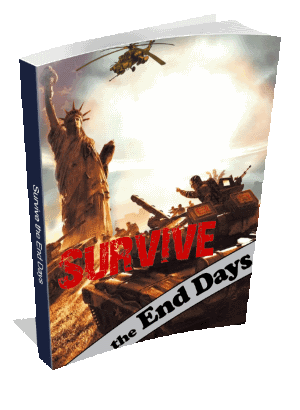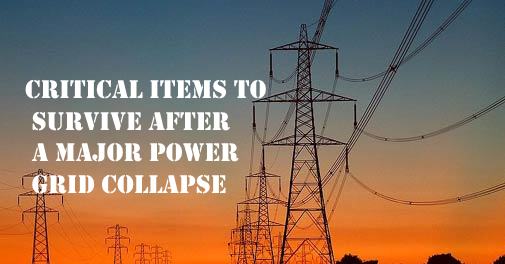We’ve all experienced temporary power outages. Sometimes they come in the middle of the night; at other times they come right in the middle of our favorite sports show. Frustrating, and an inconvenience, they generally don’t last for very long.
It’s one thing to endure an inconvenient power outage for a day or two; it’s another to be one of thousands without power in a city or larger area, perhaps in the dead of winter. Or at the other end of the scale, you could be where temperatures soar to well over 110 degrees during summer months. In one instance you are at risk of freezing to death; in another you are at risk of heatstroke or more. Your family will soon get used to the absence of television and movies and other electronic appendages. There will be other things to worry about.
Your priorities will change depending on conditions and your level of preparedness. If it is extremely hot or cold outside, that will be a priority. If you don’t have enough food or water, that will be a priority. If it is the dead of the winter months the need for light will be strong, and if you are ill or someone in your family is ill, that will become your priority.
Going for weeks or longer without power is something most of us living in developed countries have never experienced – except by choice.
Can your family survive for two weeks or longer without power?
This calls to mind what we know of as basic disaster preparedness, and there is no better time to start getting prepared if you haven’t already.
Sure, local emergency management will probably open shelters. But shelters are not comfortable places to stay or live, and if you are prepared you can shelter in place in your own home (you might choose to extend your supply of food by taking advantage of meals provided by the shelters, though).
Your two week supply for your family should include:
• Water/Water Filtration – store one gallon of water per person per day; in addition, stock water filtration devices, just in case the power outage goes beyond two weeks.
• Sanitation needs– with water unavailable except for what you have stocked, you will need to think about how to deal with sanitation – i.e. flushing toilets, washing dishes, etc. – such as:
o Paper plates, towels, cups, etc.
o Kitty litter and heavy garbage bags (if you cannot flush the toilet)
• Food – And if you plan to cook it, make sure you have a way to cook
• First aid kit with medications for the family
• Heat source for your home – hopefully wood for fireplace or woodstove if at all possible; if not, try a propane space heater.
• Lighting solution (kerosene lamp; camping lantern)
If you’ve done your homework and stocked the above supplies, you and your family will do just fine in a power grid failure for two weeks. Hopefully you will never have the experience, but being prepared is most definitely better than not.
Now, if the situation becomes more delicate and the grid will be down for an indefinite period of time than you should think of what will be your priorities. You should think that many aspects of your life will change. You will no longer have the confort of modern days and all your priorities will change. So, forget stocking for that 2-week event, it’s not that difficult. The hard part is stocking for the total paradigm shift, that few remember how to do much of. You won’t be making your own saw blades anytime soon. Now, ask yourself, what else will you NOT be making, that you need to learn how to make, or replace with older technology, before you need it (or need to trade it).

A MUCH-complete list would look like this:
1. Tools (saw blades, hatchets, axe heads, hammer heads – many sourceable from auctions, garage sales, etc.)
2. A simple still (or the components to assemble one), as this will make your alcohol for drinking, cleaning, medical use, etc. (don’t forget to learn how to make the corn mash itself, or to have extra parts put back)
3. Learn to make alternative bows (PVC bows are excellent, weather-proof), and how to turn arrow shafts, as well as how to lace and tie bowstrings – not all string will suffice for it – dacron works well
4. Learn to make filtration weirs for water. Forget store filtration units, understand how rain barrels work, how to purify water with boiling, and how settlement works to remove metals. Extra barrels are highly tradeable.
5. Forget trading foods, long-term you will have far more demand for trading seeds. Those with the most-seeds and largest fresh selection will draw the best trades.
6. Long-term storable items are great (salt, sugar, baking powder, baking soda, some cheeses, dehydrated or cured foods possibly). He who can build a primitive dehydrator, and had the parts to trade to others, will be king. Dried beans and salt-cured hams can last 24 months, these will be in demand as well. Jerky was used and looked-at differently 200 years ago (the jerky was used as a stew meat with the salt extracted to flavor soups and stews – knowing this extends the use of your stocks – and IS TRADEABLE INFORMATION!)
7. Survival information is valuable, and in a time when it is desperately needed, being able to have a few copies of condensed information on-hand and barter-ready will be very valuable, indeed. Type up and print a dozen copies of general information that others may not readily have.
8. Fire-making will ALWAYS be critical, and having a dozen extra ferroceramic rods and striking steels will be worth their weight in gold, if it all goes south.
9. Enough can’t be said for water containers. Seems simple now, but if things go wrong, one of the hardest things to usually find is a good canteen or water jug. Put enough back for yourself, but put more back for trade. The harder to break, the better. I’ve got a dozen military 1-qt canteens laying around here than there, in a pinch, I have 2-3 I’ll use, but the rest can be had – for a price.
10. Everyone needs a warm place to sleep. Funny thing is, linens wear out pretty fast – as do blankets. A good blanket is like a good coat. We’ve all planned for clothes (I hope), but when’s the last time you heard someone brag about having a couple of good wool blankets put back? I’ve got two good wool blankets. I paid $40 each for them. Let the power go out, in November, and you not have one. I don’t know how much you’re willing to pay for them, but I know what you’re going to trade me for them, if you don’t want to freeze at night. I won’t trade both at all, but I’ll be looking for what would be several thousand dollars worth of trade for the one I can ‘spare’.
See, barter comes down to how desperate (or how much does your life depend on it) you are, as to how critical it really is to have for barter. Can you live without toilet paper, versus that last wool blanket?
THIS is how barter REALLY works.
Barter is far scarier than you can even understand, if you are UNABLE to assess ‘critical need’ from ‘whimsy want’ right now. Fire, water, shelter, warmth – yeah, you’re going to pay dearly for what you didn’t see fit to pack now. Think about critical needs, before you think all that ammo is so important. I bet my wool blanket is worth AT LEAST all of your ammo, if you’re cold and we’re both armed. Again, don’t plan on thuggery, stock what you can’t afford to trade for. Have extras to trade yourself, in regards to those critical things we MUST have.
Toilet paper? LOL, Davey Crockett didn’t have toilet paper and he did just fine. HE DID have a weapon, a knife, a fire flint, a good blanket, and good clothes and boots. He traded horses, burros, saddles and whiskey. Take a 3-year, 1,000 mile trip in your mind, and imagine only meeting others on the road like yourself. Each packed differently, not all are nice, not all are passive. Now, prepare for the trip in your mind and take it. What do you see yourself needing, each day, as the seasons change, as the environment changes, and as bad and good people cross your path.
Once again, toilet paper is like a good cigar or stick of chewing gum. It might give you ‘modern comfort’, but there are far more important things you need first.
Did you pack them?
Other useful resources:
Survive The End Days (Biggest Cover Up Of Our President)
Survival MD (Best Post SHTF Medical Survival Guide Ever)
Blackout USA (EMP survival and preparedness guide)
Bullet Proof Home (A Prepper’s Guide in Safeguarding a Home )
Backyard Innovator (All Year Round Source Of Fresh Meat,Vegetables And Clean Drinking Water)
Conquering the coming collapse (Financial advice and preparedness )
Liberty Generator (Easy DIY to build your own off-grid free energy device)
Backyard Liberty (Easy and cheap DIY Aquaponic system to grow your organic and living food bank)
Family Self Defense (Best Self Defense Strategies For You And Your Family)
Sold Out After Crisis (Best 37 Items To Hoard For A Long Term Crisis)
Copyright Information:This content may be freely reproduced in full or in part in digital form with full attribution to the author and a link to www.bioprepper.com. All links in articles must remain intact as originally posted in order to be republished. Please contact us for permission to reproduce this content in other media formats.



Oh my goodness! Incredible article dude! Many thanks, However I am encountering problems with
your RSS. I don’t understand why I am unable to subscribe to it.
Is there anybody else having identical RSS issues? Anyone
who knows the solution can you kindly respond? Thanx!!